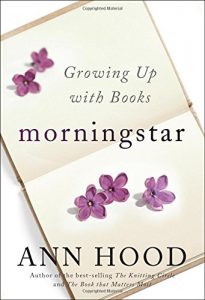A myriad of memorable memoirs
Since the beginning of the year, I’ve read several very different memoirs. Unlike novels, I’m tough on memoirs — they must grab my interest almost immediately. I find if a memoir is boring or uninteresting, then so is the the author. Yes, I’m that brutal.
However, I found each of these memoirs engaging from the first pages, despite their widely differing approaches and themes.
________________________________________________
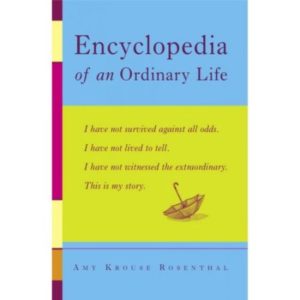 Encyclopedia of an Ordinary Life
Encyclopedia of an Ordinary Life
by Amy Krouse Rosenthal
I heard about this book on NPR and filed it away in my mental list of books I may want to read — someday. Then a friend raved about it and gave me her copy.
I was instantly laughing in my tea at the opening “Reader’s Agreement”. In this agreement (with spaces for you to sign and date), Ms. Rosenthal has a range of requests — from agreeing to refrain from taking on your cellphone while working out to giving her your credit card number so she can shop to her heart’s content at Anthropologie.
The book is called an “encyclopedia” because it chronicles the small moments of her ordinary life in an alphabetical, short-entry structure.
She has collected thoughts, observations, and decisions to create an alphabetized personal encyclopedia, complete with cross-referenced entries and illustrations. Like this…
Ms. Rosenthal reveals the minutiae of her life, from pumping gas:
Every. Single. Solitary. Time I go to get gas I have to lean out the window to see which side the tank is on.
to toast:
I cannot stress this enough: One second your toast is fine, golden brown: the next second it is black.
But then she stops the reader cold with a profound and insightful observation. There’s a touching entry on her need to complete things quickly to get them over with – eating dinner, when she’s out she wants to be home, etc.. She laments on how she can’t experience the full pleasure of an act or task until she has crossed it off her list.
Each entry reads like a short story – witty, sad, insightful and peculiar…many very peculiar.
There are some entries I found mundane and the part showing her high school yearbook signatures I found just plain boring, but then I perked up with this:
In most cases, it is more satisfying to get a friend’s answering machine and leave a cheery, tangible trace of your sincere commitment to the friendship than it is to engage in actual conversation.
There’s a section on how she contested a parking ticket on the grounds of Karma, complete with photocopies of the paperwork she submitted and the check she wrote for the 25 cents she should have put in the meter. Spoiler alert – she won.
Yes, this really is an encyclopedia of the author’s life – her hopes and dreams, childhood experiences, loves and hates, daily routine. It’s the sort of thing you can pick up and dip into to relate, laugh and even ponder — perhaps just as the author wanted.
Sadly, Ms. Rosenthal died of cancer in 2017 and she wrote “You May Want to Marry My Husband,”http://nyti.ms/2mFk0fE in her final days, some wonderful, but heartbreaking, writing
As one reviewer on the book jacket says:
An ordinary life, perhaps, but an extraordinary book.
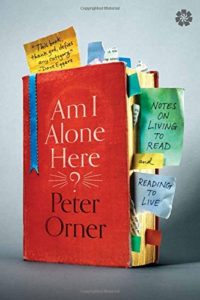 Am I Alone Here?
Am I Alone Here?
by Peter Orner
This wins the most unconventional award, as it’s described as “a book of unlearned meditations that stumbles into memoir.” (Say what?)
Mr. Orner, a professor, poses questions on literature and life and the reader is invited into this, at times, existential exploration. At first blush the book appears pedantic, but have courage readers, Am I Alone Here? is affecting on so many levels.
The author’s true love is the short story, mixed with poetry and the occasional novel. Each chapter shows a rendering of the book cover, reviews the story (or poetry), gives background on the author (many of which were unknown to me) and then, how the story relates to Mr. Orner’s own life.
Mr. Orner is a thinker — a ponderer and as with many artists he struggles with the meaning of his life as it relates to his gift…and gifted he is. There’s some staggeringly beautiful writing on display here.
On reading a book of poetry by an obscure poet:
Books pursue us. I’ve always believed this. I dug Herbert Morris out of the free bin outside Dog Eared Books (San Francisco). What compelled me to stop that day? How can I express my gratitude to a poet who never sought it, who only wanted me to know his creations, not their creator? An how many others might be out there, somewhere, under all this noise, tell us things we need to hear?
I must admit I skipped around while reading Am I Alone Here? and found some bits more interesting than others. The format is unusual which allows for picking and choosing chapters to suit. And the chapter titles — so intriguing:
Euroda Welty, Badass; Shameless Impostors; Surviving the Lives We Have; My Father’s Gloves; Night Train to Split: Unforgiveable
Don’t you just want to see what they’ll offer? My Father’s Gloves is a tender tribute to his father and, unless you’re a hard case, will bring tears to your eyes.
Sometimes heavy, often cynical, but always probing, and insightful– Am I Alone Here offers plenty to think about long after you’ve finished. An as an added bonus, if you’re like me, you’ll come away with a whole new list of authors and poets to explore.
_________________________________________________
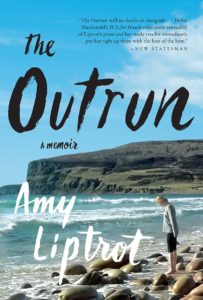 The Outrun
The Outrun
by Amy Liptrot
Amy Liptrot has returned to her childhood farm in Scotland’s remote Orkney islands, after suffering a horribly-gone-wrong life in London.
Her London life spirals out of control as she falls deep into alcoholism. She finally agrees to rehab (national health funded) and slowly works herself out of her addiction.
When I first left Orkney, my friend Sean gave me a compass. I used to wear it round my neck at parties, and when people asked about it, I would tell them it was so I could find my way home. I left the compass somewhere one night, then I was totally lost.
But go home she does. To her family farm on Orkney with a large coastal grazing area called an “outrun”. Slowly she adjusts to a gentler, slower life — sans alcohol and discovers an new equilibrium.
Eventually, Ms. Liptrot ends up on the even smaller island of Papay, population 70. She gets a job working for the RSPCA counting corncrakes (an endangered ground bird) as well as puffins and arctic terns. Her new life opens her eyes to the healing power of nature.
She joins the local swim club and finds that breath shattering cold sea swims are a new way of getting the high formally gained from drinking. (See me shivering as I write this.)
Ms. Liptrot re-discovers an interest in astronomy, as the island is one of the best places to see the stars with almost no light pollution and there are the occasional glimpses of the Northern Lights.
I’ve swapped disco lights for celestial lights but I’m still surrounded by dancers. I am orbited by sixty-seven moons.
There is a memorable passage about the rare and beautiful noctilucent clouds. These clouds are invisible most of the year, but in the summer, in this far northern latitude, they catch the sun’s rays in the last stages of twilight, as the ground grows dark. Then they burst into brilliant colors.
The first half of The Outrun was beautiful and fascinating, but by the second half, it became repetitive with the author’s “self help” observations. I must admit I skipped over much of the latter half of the book — but greatly appreciated the totality of the work.
Ms. Liptrot is an exquisite chronicler of island life so near the Arctic Circle, with starkly beautiful passages on island life, sunsets, waves and even shipwrecks
The Outrun is a brave memoir, unvarnished and beautifully written. I closed the book picturing the author living her life — strong and clean:
I stride onwards… I am a lone figure in waterproofs walking the coastline, morning after morning, miles from anywhere, at the north of nowhere. But down here, inside myself, I feel powerful and determined.
A digital review copy was provided by W. W. Norton & Company via NetGalley
________________________________________________
The New Old Me 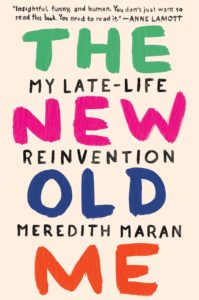
My Late Life Reinvention
by Meredith Maran
We’ll end this myriad of memoirs on a lighter note — this unexpectedly funny and uplifting memoir. From the cover blurb
Maran writes “a poignant story, a funny story, a moving story, and above all an American story of what it means to be a woman of a certain age in our time” (Christina Baker Kline)
Meredith Maran’s marriage has dissolved, her Victorian house on the edge of Berkeley lies empty, and her free-lance writing life is in shambles – so what does she do? She accepts a full time writing job at a start up firm in Los Angeles. And thus begins one woman’s story of starting over at 60 in youth-and beauty obsessed Hollywood.
One can imagine moving to a new city, making new friends, trying to find love while in your twenties, but Ms. Maran makes this move in her sixties.
She’s alone, missing her friends, her estranged wife (yes Ms. Maran is gay), her family (yes she has children from a previous heterosexual marriage) and terror-struck at having to work with millennials (remember she’s 60 – a very good looking 60 — but still it’s that number 6-0, a great distance from the twenties).
We ride along as she finds a cute and somehow affordable apartment in Los Angeles, granted it overlooks a convenience store air conditioning unit, but its hers and we delight as she decorates it from found objects and little bits from here and there. But still there’s still the bittersweet-ness of being alone:
Biggest. Surprise. Ever. That cheery feminist crap is true. For the first time since childhood, I’m responsible to no one. I can be Helena’s girlfriend or break with her without upsetting my kids or my own living situation or my finances. I can make money or rest on whatever laurels I’ve got without depriving anyone of anything. I can binge-watch Girls till midnight or go to sleep at nine. The bad news and the good news is the same. I have nothing and no one to lose.
Ms. Maran does make friends, discovers joy walking in the hills, and eventually goes on dates – once with a man, which turns into a teeth clenching experience for both her and the reader alike.
She faces death in quick succession, her best friend back in the Bay Area and then her father. During the trips back, she sells her house, finalizes her divorce, and rids herself of belongings from her her former life. A roller coaster ride of emotions which Ms. Maran somehow makes both funny and heartbreaking.
Once in awhile a writer’s voice will enchant a reader and Ms. Maran does just that. She twists what is actually heartbreaking loss into a story of resilience, love and humor. She never takes herself too seriously and her story of re-invention, re-discovery, and recovery is told with grace, wit and compassion. I adored this memoir.
Dear Fahrenheit 451, by Annie Spence
I needed a break from reading three dark thrillers in a row (just finishing my last one – really good, but more on that later.)
So I slipped over into the warm comfort of this book.
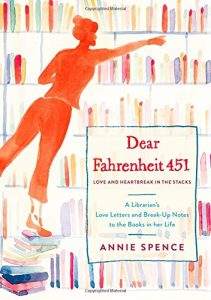 Dear Fahrenheit 451 by Annie Spence
Dear Fahrenheit 451 by Annie Spence
Love and Heartbreak in the Stacks
A Librarian’s Love Letters and the Breakup Notes to the Books in Her Life
Ms. Spence is a young librarian and both her reading taste and vernacular reflect fresh, edgy thinking. This makes for a very different sort of book about books. No guilt-inducing, preaching on the books you ought to have read (I’m looking at you Clifton Fadiman). Instead, Dear Fahrenheit 451 is comprised of breezy takes (or letters) on the books the author has read, owns, loathes, comes across, culled from the library stacks, or had patrons request.
Ms. Spence’s casual writing voice is scattered with cursing and some sex. There’s a letter to a book called The One Hour Orgasm which you’ll just have to read for yourselves, I blush — anyway suffice it to say, this book never gets boring.
Ms. Spence’s love of books and what they mean shines through. But she also reflects on the often unspoken truism that readers can, and will, fall out with a book, there are indeed books that become irrelevant, books that leave us angry, annoyed, or the worst offense of all – a book that leaves us flat.
Here’s some of my favorite snippets:
Dear Fifty Shades of Grey,
You made me say “erotica” to an old lady. I’m going to hate you forever for that…
Dear Miss Marple Series,
You guyssssss! I just want to thank you for being there for me. Everybody loves you. Seriously, everybody. I mean people who like mysteries – Doy. But also, did you know that truckers love you? You guys on audio are like a gateway drug to reading for truckers. Also, kids who read way above their grade level and are bored with everything in the children’s section. …and teens with helicopter parents who want to make sure they aren’t reading novels with sex in them (as a rule, murder in a book is A-okay with these folks).
Dear Pictorial Anatomy of the Cat,
I don’t know how you got here. Without your book jacket on – which is who knows where – one might have assume you were some sort of mythical fairy tale about kitties. But in reality your insides …are about insides. But don’t get me wrong. I thought you lateral view of the abdominal viscera was neat. But, can I say something? You’re creeping people out. You go on and on about the cutaneous maximums. This is a public library. So…Go’way Now, Annie
Dear Another Saturday Night of Wild and Reckless Abandon: A Cathy Collection,
I had to give (my friend) a little lesson on Cathy, Cathy. Because when you’re not talking about dating insecurities and how to eat feelings, you were one of the first to address the contradictions of the women who’s trying to “have it all”. You discuss the wage gap, mansplaining, and sexual harassment. You try to explain fluid gender roles in a way Cathy’s own mom might understand. Yeah, Cathy has a messy room and frets over her terrible hair. She’s trying to figure it out. That’s what makes her so lovable. I’m proud to put you right by my Gloria Steinem essays and Bad Feminist. You may be a collection of cartoons, but you’re part of the sisterhood. You’re my favorite 80’s woman.
So, aach on girl, Tiny heart, Annie
Towards the end, Ms. Spence also give us ‘special subject’ essays such as
“Excuses to tell your friends so you can stay home with your books
“Falling Down the Rabbit Hole-books that lead to more books”
“He’s Just Not That Into Literacy: Turning Your Lover into a Reader”
There’s a wonderfully funny letter to a Fancy Bookshelf at a Party I Wasn’t Technically Invited To, where, while hiding by the bookshelves, she snarks on the styled books, knickknacks and art — not to mention, the hostess.
Ms. Spence dedicates a letter to book group discussions, which she often overhears at coffee shops or the library, and has to resist the urge to break in saying — ‘OMG, you’re missing the whole point of the book –step aside and let a professional take over’.
The final epilogue is a endearing shout out to the importance of librarians and libraries. Dear Fahrenheit 451 would be a perfect gift for any librarian, library workers or book-lovers on your list. It’s a little early for the holidays, but at the very least add it to your own TBR list. I know you have one.
+++++++++++++++++++++++++++++++++++++++++++++++
Dear Fahrenheit 451
I read you in small doses which proved most enjoyable. Equally enjoyable was the long list of books added to my TBR list thanks to you and your charming, and approachable author. We have much to talk about, hey let’s meet for a glass of wine. I’ll be the one in the corner with a book ~~ BookBarmy.
+++++++++++++++++++++++++++++++++++++++++++++
A digital review copy was provided by Flatiron Books via Netgalley.
Secrets Kids Know (that adults oughta learn) by Allen Klein
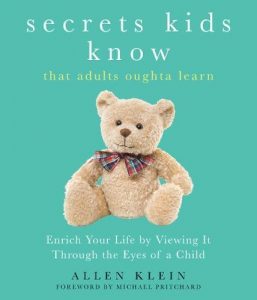 My guilty morning secret (now that I’m retired) is I’ll often make a cup of tea and go back to bed to read for a bit. That’s how I enjoyed Secrets Kids Know over the last several weeks. Turned out to be a delightful way to start my day.
My guilty morning secret (now that I’m retired) is I’ll often make a cup of tea and go back to bed to read for a bit. That’s how I enjoyed Secrets Kids Know over the last several weeks. Turned out to be a delightful way to start my day.
I’m usually not a huge fan of the self-help genre, I find they regurgitate one simple principal over and over to fill pages. But this is not the case with Secrets Kids Know.
The overall premise is as adults grow up we loose our joy in life. Which affects many aspects of our lives, from our relationships, to our careers and creativity. Mr. Klein helps the reader see a wide variety of things through children’s eyes — with his delightful insights, quotes, examples, and stories.
Each chapter (or secret as Mr. Klein calls them) is a breath of fresh air, here’s a brief sampling:
Be a Beginner, where we see how the innocence of not knowing something opens us up to all possibilities – without preconceived right or wrong.
Be a Fun Seeker, in which we see how clowning around like a kid can be restorative.
Be Curious, which asks us to use curiosity to inspire our goals. The child-like question “are we there yet?” can be turned around on yourself “Am I there yet?” or your company “Are we there yet?”
Be Truthful, where we learn how to see things as they are, and the value of honest observation, unclouded by adult preconceptions.
Each chapter ends with a “Grow Down” (vs. Grow up) assignment — more of a suggestion really — such as taking a nap, blowing bubbles out the car window during a traffic jam (gonna try that one), or consulting your child-like instinct when making important decisions.
I fear I’ve made Secrets Kids Know sound simplistic — it not. The author recognizes that adult pressures, worries, and crises can’t be solved by being childlike. We can’t always live in the moment, as if a three year old. Instead, Mr. Klein suggests that we incorporate child-like tendencies into our day-to-day thoughts and activities in order to cope with the burdens of adulthood, not to mention the nightly news.
Something as profound as being present – a Buddhist teaching I’ve long struggled with, was made relevant to my adult life with this quote:
One of the reasons children are filled with extraordinary amounts of energy and enthusiasm may be that they are in the present moment. Their energy is not wasted on a wandering mind that exhausts itself through negative emotions.
Emma Seppala
Unlike some other self help authors, Mr. Klein is no egotist. He happily intersperses his writing with other’s stories, quotes, and insights – often causing this reader to chuckle…
One good thing about five-year-olds is they are always just a Krazy Straw and some chocolate milk away from the best day ever.
Simon Cholland
Mr. Klein is a Jollytologist® (yes he trademarked it), is a professional speaker, and has written a number of books on using humor in our personal and professional lives — to motivate, harness creativity, and heal.
While I won’t be donning a red clown nose (something the author advocates), I did refresh my walking music with some Bee Gees, helped a neighbor’s 1 1/2 year old with a chalk drawing on the sidewalk, and, yes, I’ll be buying bubbles.
Thank you to Viva Editions and the author for providing me with a copy of the book in exchange for an honest and non-compensated review.
Books of books
There’s an endless number of books about books and I gravitate to them like a moth to flame. As I’ve said before on this blog, it’s a sickness I tell you, and I just can’t help myself.
This intrigue, for me anyway, is all in the shared pleasure. What are others reading? What books have they liked, nay loved? Please discuss. How do they read – favorite nook, coffee shop, bed? Tell me more. How do they keep track and record their thoughts on the books they’ve read?
But most interesting is why people read.
Over the last few months (in between other reading), I’ve devoured three such reads, from different authors, and each with different viewpoints on the importance of books and reading in their lives.
+++++++++++++++++++++++++++++++++++++++++++++++
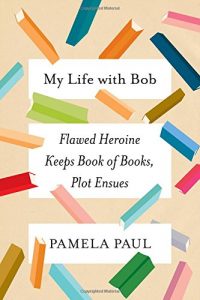 My Life with Bob, by Pamela Paul
My Life with Bob, by Pamela Paul
Ms. Paul is the editor of the New York Times Book Review and has keep ‘Bob’ — her Book Of Books — by her side since high school. How could I not instantly like someone who has kept a journal of everything she has read for 28 years? Talk about kindred spirits.
My Life with Bob is a memoir, cum literary critique with short chapters that reflect on a childhood where being “such a reader” proved to be sometimes lonely and to college where she berates herself for not having read Trollope or the Greek plays – “oh, the shame of being under read”.
Each chapter recounts pivotal points in her life, from divorce to the death of her father, where reading gave her strength, encouragement, solace or just plain escapism. She charts her life through her list of books in Bob and sees how she was formed by reading– from finding herself as a teenager through books, to ultimately a career in the book trade.
In my Book of Books, I can see the way these choices line up and read the signs along the way that reveal those decisions. Here, a novel selected with deliberation; the next, a matter of circumstance. This one was assigned, but that one a book I was dying to read. My mother-in-law gave me that book. This other one was found in the common room of a New England bed-and-breakfast. All of those choices.
Ms. Paul is funny and poignant and I found myself chuckling with her insights and admissions. After an easy, uncomplicated birth, she arranges to stay an extra day in the hospital, just so she could finish her book.
Ms. Paul takes us on her journey to becoming a major player in the book review world and how when overjoyed at a promotion from children’s book editor to chief editor of the Book Review, her children were dismayed and thought she’d been demoted.
My Life with Bob is for anyone who is a reader before almost anything else and will inspire you to start keep track of your reading thoughts.
I only wish I kept a book of books since high school. Alas, my written records only go back to 2000, when a dear friend gave me my first book journal. But I have happy memories of my early reading and the books I loved — My Friend Flicka, Anne of Green Gables, Beautiful Joe, Heidi and, of course, Little Women.
But I digress, here we go with some more books to add to your reading list.
+++++++++++++++++++++++++++++++++++++++++++++++
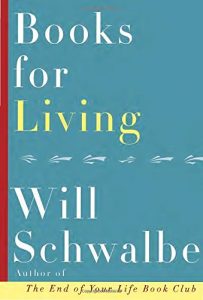 Books for Living, by Will Schwalbe
Books for Living, by Will Schwalbe
Mr. Schwalbe, is the author of the best seller – The End of Your Life Book Club, which documents the books he and his mother read as she lay dying in the hospital. (Resisted reading it, thought it might be too heartbreaking, but now maybe I’ll give it a try.) The author now takes to the page to address how books can fit with the the noise and distractions of our modern world.
In his introduction he writes that reading is “a respite from the relentlessness of technology” and that at the heart of our over-connectiveness is fear —
–fear that we are missing out on something. Wherever we are, there’s someone somewhere doing or seeing or eating or listening to something better.
He goes on to surmise that this brings on a loneliness that separates us from ourselves — and that by reading we can open our minds and grow into our own possibilities of life and living. (Not to mention a un-plugged hike in nature.)
Each chapter covers a topic in which books and reading played a key role in his life. Everything from ‘Embracing Mediocrity’ to ‘Admiring Greatness’ — there’s a beautiful chapter on loosing a childhood friend and how re-reading David Copperfield and his loss of Dora gave him comfort.
Mr. Schwalbe introduced this reader to the Chinese philosopher Lin Yutang and his famous book, The Importance of Living “is about the need to slow down and enjoy life. And, it is about the importance of books and reading.” (Don’t worry, it’s been added to my TBR list.)
It is clear that the author carries his heartbreak with him — the loss of his mother and dear departed friends:
We can’t do much for the people we’ve lost, but we can remember them and we can read for them: the books they loved, and books we think they might have chosen.
Mr. Schwalbe covers a wide range of books from many genres — The Odyssey, The Girl on the Train, The Little Prince, and one of my favorites, Anne Morrow Lindberg’s – A Gift From the Sea. He even finds a place in his reading life for cookbooks, like me, he recognizes they can be far more than just recipe collections.
The appendix for Books for Living lists just over 150 authors, books, plays, poems, stories, and journal articles which Mr. Schwalbe references in Books for Living. You definitely be adding books to your own TBR list. A most enjoyable read for any bibliophile.
While Mr. Schwalbe and I share much when it comes to reading, I was delighted that he is also considered odd — as we both are known to start conversations with — “What are you reading?”
An advanced reading copy was provided by Alfred A. Knopf
+++++++++++++++++++++++++++++++++++++++++++++++
This delightful little book tells of Ms. Hood’s coming of age and how reading shaped her. She breaks the book into ten chapters or lessons — each centering on a book that changed her outlook, built new dreams, or taught her valuable lessons.
The first chapter, or Lesson 1, is entitled How to Dream, and centers on Marjorie Morningstar by Herman Wouk. (Thus the title “Morningstar”.) Ms. Hood read the book as a teenager trapped in a Rhode Island mill town. Marjorie Morningstar allowed her to dream of something bigger. She re-reads it every year:
Maybe that’s why I reread it every year. Maybe, as time beats me up and grief or loneliness or a new kind of bittersweet melancholy take hold, I need to remind myself to keep going, keep reaching, to not forget the girl who believed she could have everything and anything at all.
Like the other two books on books, I felt a kinship Ms. Hood, but this time because of our similar ages. I found myself recognizing her descriptions of growing up in the 60’s & 70’s — with the Viet Nam war on television, girls-only home economics classes, and listening to Simon and Garfunkel. There was the confusion of the world breaking open with the women’s movement, communes, hippies, civil rights — all contrasted with our girl scout activities and mothers having dinner ready for dad’s homecoming each day. We were both girls who hid from this confusion by escaping into the other world(s) of books.
Upon being discovered secretly reading Little Women during class, her elementary school teacher asks her to stay at recess:
“You’re reading Little Women?” she asked, looking at the book in my hands. I nodded. “And you understand it?”, she asked. Again I nodded. Then she asked me tell her what the book was about. At this, I began to talk, about Marmie and the March sisters the plays they put on, about Laurie next door and vain Amy and Jo who wanted to be a writer and how Beth died. I told her it was about family but also about war and dreams and writing and…”And”, I said, “everything. It’s about everything.” Now it was Miss Nolan who nodded. She paused, then pointed to the books that lined the bookshelves in the back of the classroom. “I don’t want you to go out to recess anymore”, she said. “I want to you to stay inside and read all those books”.
(I never had the fortune of such a teacher letting me skip recess or P.E. – sighs of envy.)
Ms. Hood grew up without books at home, and she tells of going to the local library and checking out whichever books were the biggest, (Anna Karenina, Les Miserables) so she could get the most reading per book. There’s a section where a bookstore opens in a mall close by and she revels in the possibility to buy and own a book of her very own.
In Lesson 8: How to Have Sex, Ms. Hood recounts reading The Harrad Experiment which opened her mind about sex and the sexual revolution — where sex didn’t have to become intertwined with love and marriage. (I vaguely remember reading a borrowed copy in high school, and found it both embarrassing and eye opening.)
Ms. Hood could be describing many bookish children growing up, we all felt this way at one time or another:
How can I describe what reading gave to me? An escape from my lonely school days, where girls seemed to speak a language I didn’t understand. A glimpse into the possibilities of words and stories. A curiosity about the world and about people – the young Amelia Earhart seeing her first plane, Helen Keller’s silent world, Nancy Drew solving mysteries, David Copperfield surviving the streets of Victorian London.
But, fear not, the author enjoys pure pleasure reading:
Even now I like to sometimes indulge in the guilty pleasure of reading a book that literary snobs would never consider reading. And I enjoy them, those paperbacks I don’t mind leaving behind on an airplane. They make long flights pass pleasantly. I don’t have to marvel at the use of language or metaphor or puzzle over how the author pulled off such a mind-bogglingly intricate plot. I just read it and forget it, perhaps a habit I learned back in high school when I read any book I could get my hands on.
Morningstar is a lovely book and it reminds us that books can form a childhood – give escape from confusions – spark dreams of bigger things and open us to other worlds.
A digital advanced readers copy was provided by W.W. Norton & Company via NetGalley.
+++++++++++++++++++++++++++++++++++++++++++++++++
So there you go, BookBarmy fans, three more books about books to re-read, books you haven’t read, books you need to read, books you may want to read, books to consider reading…
But, no, no I’m not crazy… really.. 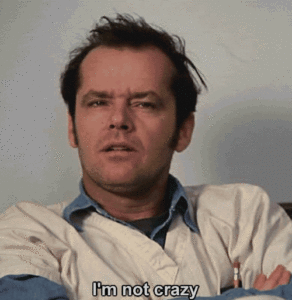
Nina Sankovitch
Every so often, a reader can’t help but form an instant connection with an author. Especially when they share a passion for the same things. That’s just what has happened with me and the author Nina Sankovitch. These two books delve into two of my favorite things — a love of reading and a fascination with old letters.
Imagine the chats we could have over a cup of tea…
Back in 2012, I read Tolstoy and the Purple Chair
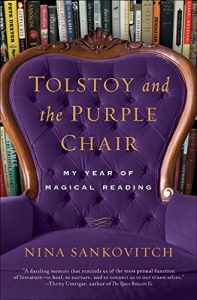 Ms. Sankovitch lost her beloved sister, Ann-Marie, to cancer at age 46. Reading was a lifelong passion for them both. During Ann-Maire’s final months in the hospital, Ms. Sankovitch read aloud to her — spending as much time together as possible during her last days.
Ms. Sankovitch lost her beloved sister, Ann-Marie, to cancer at age 46. Reading was a lifelong passion for them both. During Ann-Maire’s final months in the hospital, Ms. Sankovitch read aloud to her — spending as much time together as possible during her last days.
After her sister’s death and overcome with grief, Nina decides that the same passion that bonded her with her sister and carried her through her life will be her therapy. She will read a book a day for a year.
A book a day, I wondered? Even I, a voracious reader, can’t compete with a book a day. These were her rules:
• She would read only one book per author,
• She would not re-read any books she had already read,
• She would limit her choices to books that were no more than one inch thick, ensuring that they would, for the most part, be in the range of 250-300 pages each,
• And she would only read the kind of books she and her sister, Anne-Marie would have enjoyed together.
For those of us who want to read about what someone else is reading, Tolstoy and the Purple Chair takes us on her journey, as she reads from her favorite purple chair.
She shares her epiphanies and discoveries — all from the pages of her carefully chosen books. She intersperses her bookish insights with memories of her sister and of growing up in a bookish immigrant family who instilled in her the belief that books are not a luxury, but a necessity.
Never fear, this is not a grim tale of a painful year, nor is it an instruction manual for grieving. Ms. Sankovitch gives us a book straight from her heart, full of hope and wisdom. It’s about stopping the merry-go-round of a busy life to read, think and learn.
This book will appeal to any bibliophile, but especially for those of us who turn to books for answers, comfort and wisdom.
 Signed, Sealed, Delivered begins with Ms. Sankovitch’s discovery of an old steamer trunk she finds in her backyard which holds hundred year old letters written by a Princeton freshman, James Seligman, to his mother in the early 1900s.
Signed, Sealed, Delivered begins with Ms. Sankovitch’s discovery of an old steamer trunk she finds in her backyard which holds hundred year old letters written by a Princeton freshman, James Seligman, to his mother in the early 1900s.
These letters are fascinating, as he reports on an explosion in the J.P. Morgan building, comments on Roosevelt’s presidential campaign, and the death of his uncle on the Titanic. His letters are dry and acerbic, but filled with details.
Ms. Sankovitch’s book goes on explore the history of letter writing and we get to read correspondences ranging from the ancient Egyptians, to medieval lovers, to letters exchanged between Samuel Morris Steward, Gertrude Stein and Alice B. Toklas — the latter, some racy and fun reading.
Her section on the letters President Lincoln received after his son’s, Willy’s, death, revealed a rare bit of history. Franklin Pierce and family were in a train crash on their way to Washington DC to take office in 1853. Thrown from the carriage, Pierce and his wife watched helplessly as their son was hit and killed by the still-moving train. Pierce was writing from his own similar experience when he penned his heartfelt condolences to Abraham Lincoln.
Ms. Sankovitch interweaves her own experiences and correspondences with well-researched accounts of other letter writers in history. I love to read other’s correspondence, peeking into their day-to-day lives, hopes, and dreams.
The book is a love story to the lost art of letter writing, a wonderful way to glimpse into history and relationships — all revealed through letters:
“A written letter is a one-of-a-kind document, a moment in time caught on paper, thoughts recorded and sent on, a single message to a special recipient.”
“Sir, more than Kisses, letters mingle souls. For thus, friends absent speak” John Donne, “To Sir Henry Wollow”
Ms. Sankovitch’s own son is heading off to Harvard, and she hopes that he will write to her, as the Princeton student wrote to his mother and as Nina wrote to hers — but she knows she will have to settle for emails or text messages.
“Yes, I am waiting for an answer to my letter but waiting is not my main activity. To be dependent on e-mail and text is to have access to immediate response — but diminishes the rich opportunities that come from living with delayed gratification. For so much happens in the delay.”
This book made me think about future generations. Somehow, I suspect that no one is saving emails and text messages in old trunks. Without letters — from those who made history, shared their love for each other or, just reported on their routine lives — how will we know those long dead?
Luckily I have boxes of old letters, filled with letters from teenage pen-pals, past loves, from Husband, parents, grandfather and those I wrote to my family when I was away at college. Some rainy night – I will revisit those.
Thanks to Simon and Shuster for a an advanced readers copy of Signed, Sealed, Delivered
The Fortress by Danielle Trussoni
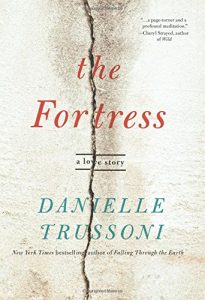 I’m busily sorting through my stack of advanced readers copies, which, I’m ashamed to say, have been piling up, unread, some for more than a year. Bad Book Barmy, very bad.
I’m busily sorting through my stack of advanced readers copies, which, I’m ashamed to say, have been piling up, unread, some for more than a year. Bad Book Barmy, very bad.
One of my January goals (beyond the annual diet and fitness ones) is to figure out which from the pile I will read and review for you, my loyal readers.
This one, with its lovely cover, ended up coming to bed with me the other night. My little book-reading light (because Husband insists on sleeping) stayed on well past midnight.
At first blush, The Fortress may seem like one of those typical memoirs recounting a romantic adventure of a couple finding, buying and fixing up a rundown French villa ~~ but no, it is so much more. More complicated, deep, and especially, more real.
From the back cover:
From their first meeting, writer Danielle Trussoni is spellbound by a brilliant, mysterious novelist from Bulgaria. The two share a love of music and books and travel, passions that intensify their whirlwind romance. Within months, they are married and embark upon an adventurous life together.
Eight years later, their marriage in trouble, Trussoni and her husband move to the South of France, hoping to save their relationship. They discover Aubais (pronounced obey, as in love, honor and . . . Aubais), a picturesque medieval village in the Languedoc, where they buy a thirteenth-century stone fortress. Aubais is a Mediterranean paradise of sun, sea, and vineyards, but they soon learn the fortress’s secret history of subterranean chambers, Knights Templar, hidden treasure, Nazis, and ghosts. During her years in Aubais, Trussoni’s marriage unravels with terrifying consequences, and she comes to understand that love is never the way we imagine it to be.
In The Fortress, Ms. Trussoni lays bare the consequences of her impulsive life. Her whirlwind romance in Bulgaria and then purchasing a run-down French villa called La Commanderie. Her husband confounds her with lies and he manipulates Ms. Trussoni into doubting her own sanity. But she hangs on to her rose-colored perception of their love. She refuses to give up, continuing to try and help the often cruel and increasingly psychotic Nikolai — trying to fix what is, in reality, a collapsing marriage.
The writing is starkly beautiful and Ms. Trussoni strikes a wonderful balance between both the dark and the beautiful sides of their love, their messy and often glamorous life, and what was versus what is.
We were both extraordinary and wrecked, naive and experienced, brilliant and stupid, our exceptional parts snapping together as seamlessly as the damaged ones.
And this heartbreaking passage when Ms. Trussoni’s mother unearths her hope chest and explains, this was what most young girls born in the 40’s or 50’s did to prepare and dream about their future marriage.
It wasn’t until later that I understood that I did in fact have a hope chest of my own. Not of wood, not locked up and hidden under a stack of quilts, but a hope chest nonetheless, one filled with dreams about my life. I believed in romance and destiny. I believed in love at first sight. I believed that when I found the right person, time would stop and we would be suspended in a state of endless passion. There was no place in my hope chest for disappointment or failure. There was no place for imperfection or broken promises or compromise. And while my hope chest ideas might have had all the trappings of a good romance, they didn’t have the capacity to hold real love.
I gobbled this book, reading it in great gulps — perhaps everything could work out, maybe some sort of redemption for them both. But The Fortress is a stingily true tale of life — real, messy and rough around the edges. Finally, there are legal battles, children’s welfare at stake, anger, tears and a resolution (of sorts).
Rest assured, despite everything, Ms. Trussoni makes it through. And in the end, this is a love story. You’ll have to read The Fortress yourself to discover the happy ending.
An advanced readers copy was provided by Dey Street Books, an imprint of William Morrow.



